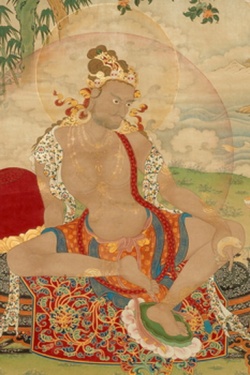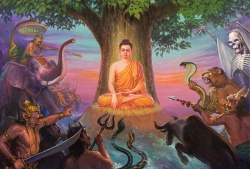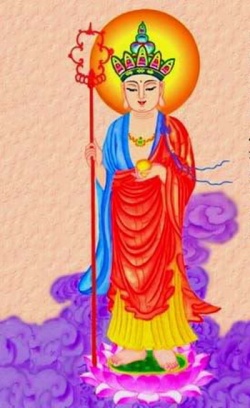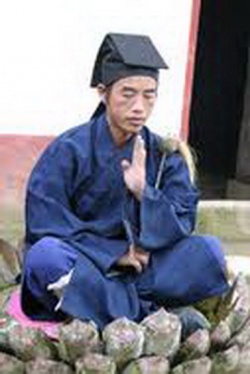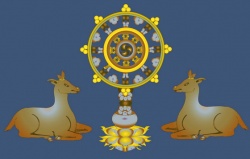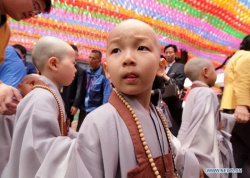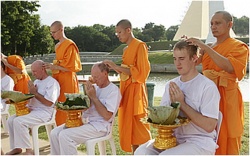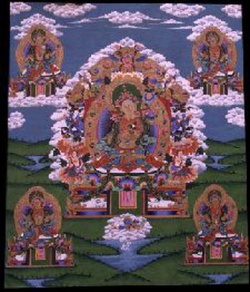On Overhearing as a Motif of Hindu Fiction
In the future Encyclopaedia of Hindu Fiction the ' over- hearing ' motif will figure large as one of the most common and prized devices of story. Its nature is very much that of a deus ex machina, designed, or rather intuitively produced, to save from death, disease, or catastrophe ; to procure fairy-tale wealth and success ; or to furnish helpful information or instruction in perplexing situations. Whenever and wherever the hero is in danger or trouble, he happens to overhear a pair of beings, divine, demonic, or animal who tell him how to extricate him- self. If the hero is destined to emerge from poverty or low station, usually quite abysmal, to unexpected and not to be expected wealth or glory, the conversing pair point the way. And, again, if someone in the story needs guidance, moral or worldly- wise, his course will be determined by what two say to each other in conversation.
The motif is for the most part progressive. Earely is a story designed around overhearing; the motif enters when there is a hitch, a point where the hearer of the story is perplexed as to what will come next, meaning, how will the narrator extricate himself, or save the situation. Just at that point the principal
a The present article continues the encyclopaedic treatment of Hindu fiction planned some years ago, and since then substantiated in a num- ber of my own papers, and one by Dr. E. W. Burlingame ; see this Journal, vol. XL, p. 1 note. I have published since, The Dohada, or Craving of pregnant women: A Motif of Hindu Fiction; and Dr. W. Norman Brown has published 'The Wandering Skull,' A. J. P. XL. 423 ff. Additional articles by pupils of mine or by myself are either in the press, or ready for the press.
person, or his aid and confidant will overhear to his advantage. The story usually has come to an impasse; the motif releases the stand-still.
The character of the conversation overheard, of the persons speaking, and of the suggestions and actions derived from them is distinctly two-fold, natural or magic. In the first kind we have a dramatic motif, imaginable in the world of experience, and often met with in experience; in the second kind the persons conversing, the things they report, and the actions following the report belong to fairytale. Hereinafter we shall designate the two kinds respectively as empirical and fabulous. A poor man overhears an old couple deliberating what they should do with their daughter and their money. They decide to consult the statue of a Bodhisattva, perhaps he will tell them in a dream, or otherwise.
The poor man hides himself in the hollow of the statue and tells the superstitious couple to marry their daughter to the first man that comes to their door in the morning, him- self, of course — that is empirical overhearing. A prince, blinded by a trick of adverse fate, passes the night under a banyan tree, and overhears a pair of gigantic Bharanda birds, which are found in the fairy-tale fauna, but nowhere else. They tell that the father of a certain lovely but blind princess has proclaimed by beat of drum that any one who restores her sight shall obtain her hand and half the kingdom. Moreover, that upon this very tree grows a creeper whose sap restores sight. The prince cures his own blindness, hides himself in the tail-feathers of one of the Bharanda birds who happens to be going to the city of the princess, and restores her sigirt — that is fabulous overhearing. The difference in atmosfere of the two classes is shown well by the illustrations just given; very rarely do the features of the two classes blend.
Theoretically, any pair of sentient and intelligent beings hold the conversation overheard. In the empirical class they must be humans. The fabulous class does not incline towards those whose intelligence or shrewdness might be presumed to be high- est. Gods, personal and symbolic, sages, or ordinary human beings are overheard rarely. Thus there will be found in the following pages: Qiva and Bhavani; a Yaksa; five Yaksas; Dewatawa, and Dewataw T (house-divinity couple) ; image of a deity ; two heaven dwellers ; ' Doer and Deed ' ; ' Two Dancers '
(day and night) and 'Six Dice-players' (the seasons) ; unde- fined voices in the air ; lamps at Divali time ; two ascetics in the air (caranacramana) ; abbot and his pupils. Animals figure most frequently, notably birds, but also jackals, famed for their yelp, as well as their cunning. Thus parrot couples, or parrot and maina (talking birds) ; two hansas; two cocks; two ravens; two little doves; eagle and her young; jay and her brood; two love birds (probably parrot and maina). Especially the fabulous bharanda or bharunda birds ; and great birds in the nature of vultures. Undefined birds; Bihamgama and Bihamgami (vihariigama) ; birds ' Sudrabror and Eudrabror.' Of other animals, two jackals ; one jackal ; monkey pair ; two calves ; two bullocks; bullock and dog; two serpents; two frogs. Very characteristic are Eaksasi (ogress) and her children; and the bloodthirsty father and small boy in the crown of a tree.
On the whole the conversation of birds is the standard source of information. ' A little bird told me,' seems to be the Tock bottom of the notion, founded upon the sincere folk-lore feeling that the chirp and twitter of birds is the prime and natural source of otherwise inaccessible information. So Sigfrid hears two birds talking above his head in Hagen's Heldensagen, vol. 1, p. 345. Or, woodpeckers warn Sigurd, after he has slain Fafnir, that he must also slay Fafnir's brother Begin, who ' scarce may be sackless of the deed,' and who also desires Faf- nir's hoard ; see Volsunga Saga, edited in the Camelot series by W. Halliday Sparling, p. 64. 2 At one point the story works its way to a curious salient : the birds become irritated at this ever- lasting eaves-dropping on the part of their overhearers. In Parcvanatha Caritra 1. 231, the good Prince Lalitanga has lost his eyes in a bet with his evil servitor Sajjana. Miserable, he is sitting by night under a tree upon which perch two Bha- randa birds which will in due time tell him in conversation how to restore his sight. The younger bird asks the old bird, ' Father, is there any way by which sight may be restored ? ' The older at first answers evasively, 'because at night, surely, trees have ears.' This curious statement must not be regarded as a
floating proverb, such as, ' the earth hears,' or ' walls have ears,' but as a brachylogic allusion to a definite occurrence. [[Kathaoga, p. 164, in its version of the story of Lalitafiga, has in the same connection : ' My child, I will tell you in the day, after looking round, and not at night. Very cunning people wander about under the banyan tree, like Vararuci.' 8 The same stanza is quoted in No. 26 of the Gujarat! Pancakhyanavarttika (see Hertel, Das Pancatantra, p. 144, note 2), to wit:
diva niriksya vaktavyarii ratrau naiva ca naiva ca, samcaranti mahadhurta vate vararucir yatha.
According to Hertel this stanza stands also at the head of No. 29 in Hemavijaya's Katharatnakara. It alludes to the well- known story, Kathas. 5. 14 ff. in which Vararuci, hidden in a palm-tree, overhears the conversation of Raksasas, finds out why the dead fish laughed, and so saves the life of a Brahman, and himself gets out of a tight place. We observe that the idea that one must not blab secrets at night is here in a fair way to become a proverb, yet never became one. 4
The motif is an old one, going back even to Vedic times. In Chandogya Upanisad 4. 1 and 2 Janagruti is a pious man, devoted to charity, 'spending much; cooking much; causing rest-houses to be built everywhere, so that people from every- where might be entertained by him.' Some hahsa-birds fly by at night: one says to the other: ' I say, blear-eye, don't you see, Janagruti's brilliance is spread out like the heavens, don't touch it, don't burn yourself ! ' The other hansa replies : ' What sort is he of whom you speak as tho he were Raikva with the push- cart?' Janagruti overhears, institutes search for Kaikva, finds him sitting under his push-cart, scratching his itch. For all that, Kaikva owns the great Upanisad doctrine which Janagruti extracts from him only at the price of 1,000 cows, a gold neck- lace, a wagon with mules, and his own daughter. The motif occurs also a single time in the Mahabharata;
see below, p. 327.
Fabulous overhearing may be treated under the three heads indicated above, beginning with cases in which the conversation overheard saves from death, sickness, or other danger to person. One version of the classical story, 'Why the dead fish laughed/ 5 alluded to just now, is as follows : King Yoga- nanda sees his queen leaning out of a window to converse with a Brahman.® Trivial tho the circumstance is, he flies into a passion and orders the Brahman to be put to death. As the Brahman is being led off, a fish in the market, dead tho it be, laughs aloud. The king stops the execution of the Brahman, and asks his minister Vararuci for an explanation of the mys- tery. On the advice of Sarasvati, the goddess of wisdom, he takes up a position on the top of a palm-tree, and soon sees a horrible Eaksasi coming past with her children. When they ask her for food, she says: 'Wait, and I will give you to-morrow the flesh of a Brahman, he was not killed to-day.' ' Why was he not killed to-day ? ' ' He was not executed because a fish in the town, tho dead, laughed when it saw him.' ' Why did the fish laugh ? ' '
The fish said to himself, all the king's wives are dissolute, for in every part of his harem are men dressed up as women. Nevertheless, while these escape, an innocent Brahman is put to death— and this tickled the fish so that he laughed.'
In Kathas. 29. 69 ff . Kirtisena, the virtuous wife of the mer- chant Devasena, maltreated by her step-mother during the absence of her husband, escapes from her home and wanders in the forest. One night she hides in the hollow of a tree, and she sees a terrible Eaksasi approaching, accompanied by her young sons. The Eaksasi ascends the tree, her sons after her, saying, ' Mother, give us something to eat.' The Eaksasi says : ' Today my children, I went to a great cemetery, but I did not obtain any food, and though I entreated the congregation of witches, they gave me no portion.' The Eaksasi continues to tell how she appealed to Qiva who told her to go to the city of Vasudatta. Vasudatta is suffering from centipedes in his head, and will die ; then the Eaksasi will eat his flesh. Her children then ask : ' If the disease is discovered and removed will that king live, mother? And tell us how such a disease can be cured in him? ' The Eaksasi describes the cure which consists of anointing the head of the king, and applying hot fomentations, so that the centipedes will pass from the head into a pitcher of cool water. 7 Kirtisena practices upon the king, succeeds in curing him, is richly rewarded, and in due course is reunited with her hus- band. 8
Some versions of the famous a-pra-ci-kha story, in which a murderer is found out, because he reports these four acrostic syllables which are the last message of his victim, avail them- selves of the overhearing motif to save from death. In the version of this story in the Kathaprakaca, called Brahmana- katha, 9 a Brahman leaves the city of Ujjayini in the company of a servant, because he was not considered worthy of the same honors as were paid to Kalidasa. He arrives at Kalanjara, whose king bestows upon him munificent largess, whereupon he starts to return to his home. His servant, deciding to kill him for his treasure, is induced to report to his father the victim's last message, namely, the word apragikha. Because no one can interpret this message, the king becomes melancholy, and is about to die. The sage Vararuci, passing the night on a fig- tree, overhears the conversation of a she-jackal with her young, in the course of which the acrostic is explained as consisting of the first syllables of the four lines of a verse, which means, "This man having stepped upon the crest-lock of thy son, as he slept in the forest, cut off his head with his sword.' Then the servant is punished and the king returns to the normal enjoyment of his position.
In Siddhi-Kiir, the Mongolian version of the story, 10 the king consults all the wise men of his country as to the meaning of the message ' abaraschika,' but they, being unable to interpret it, are threatened with execution. An humble priest among them escapes, hides under a tree, and hears 'a small boy ' in the crown of the tree begin to cry. His father calls out : ' Do not cry, my son ! To-morrow the king will execute a thousand men ;
'A totally different cure of centipedes in the head is performed by Doctor Jivaka in Ralston's Tibetan Tales, p. 103.
•Tawney, in his Translation of Kathasaritsagara, vol. 1, pp. 260, and 263, note, has Western parallels to sundry points of this story. In O'Connor, Folk Tales from Tibet, p. 166, a boy overhears two ravens tell how to drive spiders from the ears of a princess.
if we do not eat the flesh of these men, who will eat it ? ' The boy asks ' Why will he execute a thousand men ? ' The father answers, ' Because they do not know the meaning of the word abaraschika/ The father explains the word, the overhearing priest reports, and the murderer is duly executed. The story is also reported by Grierson as Maithila folk-lore; see Indian Antiquary x. 366 ft Cf. Zachariae in Zeitschrift fur Volks- kunde in Berlin, 1903, pp. 16 ft Cf. the similar acrostic story (du, sa, na, so) Lohakumbhi Jataka (314).
According to Hertel, Das Pancatantra, p. 145, the Apragikha story is reproduced as the 29th of Hemavijaya's KatMratna- kara. An echo of this story again introduces Vararuci as solver of riddles in the 26th story of the Gujarat! Pancakhyanavart-tika : 1X A king is intrigued by a series of riddles which a parrot brings to him, written on a leaf of paper. Five hundred pundits in the king's durbar are unable to solve them ; the king threat- ens severe punishment if they cannot find the solution within seven days. One of them Virocana (Vararuci) hides himself in a hollow tree, and overhears a pair of bharanda birds, father and son. The little bharanda is hungry; father puts him off for the next day when the king will slay 500 pundits whose blood the child may then drink. He then tells the solution of the riddles which Virocana takes home with him.
Once more the Kathapraka§a' 12 has a story in which life is saved by overhearing, from the conversation of a she-jackal and her young, the solution of a riddlesome situation. The story is of particular interest, because there is emboxed within it an- other story in which overhearing unravels an even more tangled skein. The pair shows the motif at high water — both constant and mechanical:
Vibhisana, king of the Baksasas, is told by a vassal Vidyun- malin that his panegyric (virudavali) is shared by Bipumjaya, king of Kanti. Because such participation means loss to him of the secret powers conferred by that panegyric, he sinks into melancholy. Mandodara, wife of Eavana, bids him be of good cheer: she will find out whether Eipumjaya really possesses the magic powers, and not merely the empty sound of the panegyric.
She packs three skulls into a golden basket and sends them to Kipumjaya with the request to state their respective values. 13 Kipumjaya refers the matter to all the jewelers of his city, but they say that they know how to appraise jewels, not skulls. Then Kipumjaya., in danger of losing his reputation for magic power, becomes low-spirited and refuses food and drink. During the general mourning that ensues, a wise man, Subuddhi, camps under a banyan tree outside the city, where is the lair of a she- jackal. She returns there by night without prey, and puts off her hungry young with the promise of a particularly rich feed next night. But she refuses further information, because rogues listen by night and bring schemes to naught.
The wives of two kings, about to be confined, agree to marry their children to each other, in case they are of different sex. Both bear girls. One of them pretends that her child is a son, and in due time they are married. When the true state of things becomes apparent the 'bride's father angrily threatens war, but his ministers advise him to have the fake son-in-law slain during a hunt. When they ride out, the horse of the fake prince runs away, but stops at night under a tree. He over- hears birds telling that under that very tree there is a well which has the property of changing sex. The fake prince avails himself of this information, and all turns out well.
This rather irrelevant story fails to assuage the hunger of the jackal young, so that the mother finally has to tell them that the king and many citizens will die of hunger and become their meat. She also betrays the secret of the three-skull test, all of which Subuddhi overhears and reports to the king. Thus the messengers who have brought the three skulls have to return without having robbed Kipumjaya of his magic superiority, and incidentally (thru starvation) of his life.
Once more the fundamental traits of this type appear in the muddled welter of the Siamese Paksi Pakaranam, or Bird Pan- catantra. 15 The pious god Deva Brahma decides to destroy the impious god Loka Brahma by propounding riddles (Sphinx motif). Loka Brahma has seven days' leeway. He wanders about restlessly, until, in the evening, he hides in a hollow tree, on which is the nest of an eagle. The mother eagle returning without food, puts off her young until the next day when Deva Brahma will slay Loka Brahma ; also explains the riddles. Loka Brahma is saved.
There is, next, a highly organized type of story, in which the friend of the hero saves him from a succession of dangers, im- posed by a curse, or prearranged by destiny. In Kathas. 28. 113 ff., overhearing ' what seemed to be voices in the air ' is the deus ex machina. A young prince, attended by a merchant's son, his friend, sets out for Ahichatra, in order to be married. The party camps on the bank of the river Iksumati. The prince gives a wine-party, and, after he has gone to bed, begins to tell a story at the solicitation of his nurse. In the midst of it, being tired and intoxicated, he is overcome by sleep. So also his nurse; but the friend, who remains awake, hears the voices in the air.
One of them says : ' The wretch has gone to sleep without telling his story ; therefore, I pronounce a curse on him. To-morrow he shall see a necklace, and, if he takes hold of it, it shall cling to his neck and kill him.' Three other voices pro- claim additional dangers to the life of the prince: death from eating the fruit of a mango tree; if he enters a house to be married, the house shall fall on him and kill him ; if he enters his private apartment on his nuptial night, he shall sneeze a hundred times, and if some one there does not say a hundred times, ' God bless you,' he shall fall into the grip of death. And if the person who has heard all this shall inform him, in order to save his life, he also shall die. The merchant's son saves the prince from one peril after another, but, being present in his marital chamber when he sneezes, he is suspected, and ordered to be executed. Of course, in the end, he explains, and every- thing turns out well. 1 ' 6
A variant form in Frere, Old Deccan Days, pp. 74 ff. (Eama and Luxman) ; W. C. Griggs in A. M. Barnes, The Eed Miriok, p. 53 (see W. Norman Brown, JAOS. xxxix, p. 45). The story
"Tawney in his Translation, vol. 1, p. 253 note, cites Hindu and Western parallels.
is elaborated in a totally different way, introducing two divine birds, ' Bihamgama and Bihamgami,' in Day, Folk-Tales of Bengal, pp. 40 ff.
In Day's collection (pp. 132 ff.) Bihamgama and Bihamgami again are overheard, so as to save life: Prince Sobur has mar- ried the wise daughter of a merchant. Six other daughters are jealous and throw ground glass into the marriage bed ; this enters every pore of Sobur. In great pain he is carried back to his royal home. His wife, a dagger in her hand, starts for the prince's house. She sits down under a tree to rest; the young of a pair of birds, Bihamgama and Bihamgami, on that tree, are threatened by a serpent.
This she cuts in two; the parent birds return and are told by the young how they had been saved. Then the bride overhears the two birds say that, if the dung on the soil about there be ground up and spread on the body of the prince, he will be cured. Moreover, that he, Bihamgama, can take the young lady on his back. She gathers the dung, is carried by the bird, accomplishes the cure, and lives happily as queen of King Sobur. Andrew Lang, The Olive Book, p. 127, manipulates the story so as to introduce a princess Diwani, and two monkeys.
In Vikrama Carita (Indische Studien, xv. 344) the over- hearing motif promotes king Vikrama's standard role as a sort of Harun-ar-Bashld. Eoaming by night he finds himself under a tree and hears the conversation of some birds: 'What won- derful thing has any one of us seen to-day?' Some bird an- swers :'Iam sorely grieved to-day. In the ocean on an island lives a Eaksasa king to whom is offered daily a human being from one house after another. It is the turn of a friend of mine in a previous birth to offer his little son.' Vikrama, in obedience to his audarya, goes and offers himself in place of the boy. The Eaksasa, seeing him serene of countenance in his high purpose, asks him if he is not afraid of death. Vikrama tells him to attend to his business. The Eaksasa, pleased, tells him to choose a boon. Vikrama says: 'From this day on desist from killing living beings.' The Eaksasa consents.
In Parker, Village Folk-Tales of Ceylon, vol. 1, pp. 157 ff., a prince's wife misbehaves with a Nagaya (cobra), and decides to kill her husband, the prince. The Nagaya tells her to ask the prince where his death is, and she finds out that it is in his
thumb. The Nagaya lies in wait for the prince, in order to bite him in the thumb, but is slain by the prince's retinue. The princess has a golden waist-chain made, places the Nagaya in its case, and puts it round her waist. Then the princess pro- poses a riddle-contest to the prince : ' I will ask you a riddle. Should you be unable to explain it, I will kill you. Should you explain it, you shall kill me. He agrees, and she says : ' The Naga belt is the golden waist-chain ; explain it, friend ! ' He fails, so she is to kill him the next day. But the house-divinity living in an ironwood tree knows. The prince's eldest sister, coming for a visit, stays that night under the ironwood tree, overhears a conversation between the house-divinity and his wife (dewatawa. and dewatawi) in which the riddle is explained. She tells the prince, just as he is about to be beheaded, and in his place is beheaded the princess.
In folk-lore there are a few cases in which overhearing not only saves life, but goes so far as to restore life to some one who has been iniquitously killed. Thus in Stokes, Indian Fairy Tales, pp. 5 ff ., the Phulmati Eani has been killed twice by the hostile machinations of the shoemaker's wife, but she comes to life again in the house of the Indrasan Eaja's gardener. The Indrasan Eaja sees her, falls in love with her, and marries her. One night the shoemaker's wife smears her mouth with blood while she is asleep, and next morning accuses her of being a Baksas, who was sure to harm her husband.
So Indrasan Eaja cuts his beautiful wife in pieces. The Phulmati's arms and legs grow into four houses; her chest becomes a tank, and her head a house in the middle of the tank, her eyes turn into two little doves. Indrasan once rests in the house in the middle of the tank and overhears the two little doves say that he is the man who cut his wife to pieces, but that every midnight the Eani and her servants come to bathe in the tank. The Eaja must get all their dresses, throw away all the yellow ones, keep- ing only the red one. The fairy servants pick up the yellow dresses and run away. The Eaja comes back to Phulmati with the red dress, and she begs for it, because without it she must again die never to come to lffe again. The Eaja falls at her feet, begs her pardon and they are reconciled. And he gives her back her dress.
In Bompas, Folklore of the Santal Pargavas, p. 464, a boy
overhears two birds tell how his murdered sweetheart can be regained. In Dracott, Simla Village Tales, p. 236, the hero hears two love-birds talking. One tells how she was the Avar Pari, the heroine, who had been enticed away from the hero, while he slept, and thrown down a well. Reunion follows.
In Frere, Old Deccan Days, pp. 136 £E., a Prince Beautiful has died trying to overcome obstacles (perform stunts) to gain the hand of a princess who will accept no one, unless he fulfills her impossible conditions. The king, her father, disgusted with the princess, who has in this way been the cause of the death of many suitors, orders her to be married to the dead prince, and both of them to be taken to the jungle. The princess falls in love with her beautiful dead husband. She overhears the con- versation of two jackals, the outcome of which is, that the sap of the leaves of the tree under which the couple are lying should be applied to the ears, upper lip, temples, and also the wounds of the prince. He comes to life, and after further adventures, they live happily.
Eelated is Bompas, Folklore of the Santal Pargavas, p. 309. A boy dies, his mother follows him to the next world. She over- hears him telling his heavenly wife that he will be reborn to the same mother. He will then employ a number of ruses to accomplish his death. The mother, of course, frustrates all his efforts.
Next to saving from death, the overhearing motif furnishes the trick for curing disease. So In the story of Prince Lali- taflga and his faithless servitor, which is told in Parcvanatha Caritra 1. 61 ff. ; in a briefer form in Kathakoca, pp. 160 ff. ; and in Suvabahuttarikatha, No. 72 (see Hertel in Festschrift an Ernst Windisch, pp. 149 if.). 17 The story runs as follows: Prince Lalitaflga is given over to well-meant liberality (dana) which he carries to excess. Owing to a disagreement with his father about this matter, he leaves the royal city in the company of a servitor, named Sajjana, who, however, belies his name in being a wicked fellow (durjana). While traveling, they discuss the relative merits of virtue and vice as guiding principles of
"According to Leumann, in a note on p. 239 of Tawney's Transla- tion of the Kathakoga, the story is found also among the Avacyaka Tales.
life, Sajjana taking the side of vice. They make bets which are decided by judges against Lalitafiga, who thereby loses to Saj- jana his horse, his jewels, and, finally, his eyes. Blind Lali- tafiga sits under a banyan tree, and overhears the conversation of bharunda birds. They tell of Puspavati, the blind daughter of Jitacatru, king of Campa. Jitacatru has had the drum beaten to proclaim that any one who shall cure her of her blindness shall marry her and obtain half the kingdom. There is a creeper under that tree whose sap cures blindness. 18 Lali- tafiga cures his own eyes by the sap of that creeper, travels in the tail-feathers of one of the bharunda birds to Campa, cures Puspavati, and marries her. Sajjana ultimately comes to grief.
The version of the Suvabahuttarikatha substitutes character- istically for the Mephistophelian Sajjana, a barber, who is the type of a low-lived person in India. 19 It shows also other signs of folk-lore treatment, and introduces traits from other stories (see Hertel, Das Pancatantra, pp. 127 ff., 279 ff.)
In Kathakoga, pp. 55 ff., Madanavati, beloved wife of king Sinhadhvaja of Surapura, is afflicted by an evil smell which arises in her body. She had in a previous birth expressed loath- ing of the smell of a great hermit whose body, defiled with dirt, perspired in the heat of the sun.
When the physicians pro- nounce her incurable, the king has a palace built in the middle of the forest, and abandons her there, in charge of trusty war- riors. The queen, concluding that this is the fruit of her actions in a former life, bears her trial accordingly. She overhears the conversation of a parrot couple which reveals her prenatal fault. The hen-parrot asks her mate, 'My lord, is there any remedy for her complaint?' The cock-parrot says, 'If for seven days she worships the mighty Jina three times a day with sweet- smelling substances, she will be relieved of her affliction.' She does so, and is restored to her husband.
In Paficatantra 3. 10 (Purnabhadra 3. 11, and so on), a prince wastes away because of a serpent in his belly. 20 He goes away from home in despair. A certain king is offended by one of his daughters, who, wisely instead of flatteringly, says to him : ' Enjoy, great king, what is your destiny to enjoy ! ' 21 ' She is married to the prince, who then happens to go to sleep upon an anthill. She overhears a conversation between the ser- pent in his belly and another serpent that has come out of the anthill, and learns how to cure her husband. The same story is woven into 'Wanderings of Vicram Maharajah/ Frere, Old Deccan Days, pp. 120 ff. Benfey, Das Paficatantra, 1. 370 cites Western instances in which animals reveal the cures for diseases.
Not only death and disease are cured by overhearing, but mis- fortunes and tricks of fate of all sorts are obviated, or disen- tangled by the same facile means :
In Pargvanatha 22 7. 428 ff. queen Eati robs her co-wife Jaya- sundari of her son, has him deposited in a temple of a divinity, and substitutes for him a dead child. The Vidyadhara king of Kaficanapuh sees the boy and induces his childless wife to adopt him, under the name of Madanankura. When the boy has grown up, trained in the arts (vidya) of the Vidyadhara race, he roams in the air, and sees his own true mother, Jayasundari, standing sadly at a window of the palace. Palling in love with her, he puts her upon his chariot.
She in turn falls in love with him. Madanankura's brothers in a previous birth are in heaven, and thru superior insight know that their brother has carried off his own mother. Assuming the guise of a pair of monkeys, they jump upon a branch of the tree under which Madanankura sits with his mother. The male monkey suggests to the female that they should bathe in the holy bathing place of Kamuka, possessed of the property of turning animals into the glorious state of men. The female refuses, because the human being under them, who had carried off his own mother, was too depraved to have even his name mentioned. Madanan- kura, overhearing, gathers that Jayasundari is his mother, and,
simultaneously, Jayasundari realizes that Madanankura is her son. By consulting a Muni they verify their relation, and are, in due time, restored to their proper stations as wife and son of king Hemaprabha.
The preceding story is the source of a folk-lore version, nar- rated by Day, Folk-Tales of Bengal, pp. 105 fL, where two calves expose satirically man*s brutish ignorance and immoral- ity. Other versions or fragments of this story may be found in Parker, Village Folk-Tales of Ceylon, vol. 3, p. 196; Knowles, Folk-Tales of Kashmir 2 , pp. 117 3. ; and in Pandit Natesa Sas- tri's Story of Madana Kama Eaja, as quoted by Parker, ibid, p. 197 note.
In Prabandhacintamani, p. 173, a certain merchant devotes himself to a courtezan. His wife, distressed, consults a man from the country of Gauda, who says : ' I will put your husband into such a state that you can lead him about with a string.' He gives her a drug, she administers it to her husband, and, lo! he becomes a bull before her eyes. She has to bear the reproaches of the whole world in consequence. One day, when she leads her husband to pasture and rests herself under a tree, she overhears a conversation between Civa and Bhavani from which she gathers that in the shade of that very tree grows a simple which confers on any creature the state of man. The woman thereupon marks out with a line the shadow of that tree ; feeds the bull the plants growing within, whereupon he is re- stored to his original form.
In all preceding instances the uses of overhearing are, as it were, negative, since neither death, disease, nor misfortune are in the usual order of experience. There is another sfere for this motif, positive, brilliant, and fairy-tale-like, namely, when the listener overhears and obtains a tip which leads him out of poverty or lowly station into affluence, royalty, or other high position. There is here one very characteristic type which de- serves first treatment, namely, that in which the conversing parties tell of grand benefits which may accrue to others at their own expense. Of this they are quite proud, in the manner of the school-boy who boasts of the largest mumps or the most barking cough. Indeed the entire conception foots somehow in popular humor. As a rule there is no reason why the con- versers should betray the secret which is sure to make meat of
them, so that in one very classical instance the trait is intro- duced rationalistically by an episode well calculated to produce preliminary irritation in the souls of the conversers. In Ni- grodha Jataka (445) three youths Nigrodha, Sakha, and Pot- tika are returning from the University of Takkasila, where they have finished their education. They arrive at Benares, and pass the night in a temple-court under a tree. Some cocks are roost- ing upon that tree, and the cock at the top lets a dropping fall upon a cock near the bottom: 'What is that fell upon me?' asks this cock. '
Do not be angry, Sir,' answers the other, ' I did not mean to do it.' ' Oh, so you think my body is a place for your droppings! You don't know my importance, that is plain ! ' To this says the other, ' Oho, still angry, tho I declared I did not mean it ! And what is your importance, pray ? ' 'Whoever kills me and eats my flesh will receive a thousand pieces of money this very morning : is not that something to be proud of ? ' ' Pooh, pooh,' quoth the other, ' proud of a little thing like that ! Why if any one kills me and eats of m/ fat, he will become a king this very morning ; he that eats the mid- dle flesh, becomes commander-in-chief; he that eats the flesh about the bones, he will be treasurer ! ' Needless to say, the two cocks soon fulfil their glorious destiny. See also Siri Jataka (284).
In general, however, this fabulous property of birds is over- heard and utilized without anything that has passed to motivate it. A parrot and a maina quarrel as to who is superior : he who eats the maina's flesh becomes a minister, the parrot's a king ; Temple, Indian Antiquary xi. 342, and note ; Steel and Temple, Wide-awake Stories, p. 139. Cf. also Ind. Antiquary iv. 261; xvii. 75; The Orientalist, vol. ii, p. 150; Swynnerton, Indian Nights' Entertainment, pp. 276 ft; Knowles, Folk-Tales of Kashmir 2 , pp. 78, 167 ff. ; Parker, Village Folk-Tales of Ceylon, vol. i, p. 80 bottom; Natesa Sastri, The Story of Madana Kama Eaja, p. 125. Steel and Temple, on p. 326 of their book, trans- late the following verse from folk-lore :
' Who kills a parrot and eats him under a tree, Should have no doubt in his mind, he will be a great king. Who kills and eats a maina, let him be patient. Let him not worry, he will be minister for life.'
In Ealston, Tibetan Tales, p. 129, a Brahman, skilled in omens, hears a cock crow, and says : ' He who eats the flesh of this cock will become king.' See the foot-note there for important West- ern parallels. In Julg, Kalmiikische Marchen, p. 11, the son of a Khan and his faithful servitor, launched on adventure, over- hear the conversation of two frogs, a yellow and a green : ' If the prince and his companion but knew, they could cut off our heads with a stick ; if the prince would cut off mine, the golden-yellow frog's head, and his companions thine, the emerald-green frog's head, they would both spit gold and jewels.
More frequently animate beings do not incidentally immolate themselves in order to elevate the social status of their over- hearers. The determinant is here not vanity, but expressed or implied benevolence. The implication of benevolence belongs to the good-fairy type. But to some extent at least the conver- sation is of the purely deus ex machina variety. The story needs it ; it is invented, and soon becomes commonplace. Here belongs first of all an important feature of the story of Vasava- datta (Gray's summary, p. 29) : Prince Kandarpaketu, in love with a dream-maiden, overhears the conversation of a parrot with his maina wife. He tells that Vasavadatta also had seen in a dream a youth of matchless beauty (Kandarpaketu), and that her maid Tamalika had volunteered to tell him of her love.
The lovers are soon united. In Parcvanatha 7. 87 ff. the two princes Amarasena and Varasena are exiles from court, owing to the intrigues of their stepmother. In a forest they overhear a parrot couple aver that they, the two princes, are worthy of happiness, but that they have not the means of procuring it. The female then tells that on the mountain of Sakuta grow two Sahakara trees, sprinkled by the Vidyadharas (nabhaccara) with their magic art (vidya). The fruit of one of the trees pro- cures royalty; he who eats the other, from his mouth fall daily in the morning 500 dinars. The parrots fetch the fruits: in due time Amarasena eats the fruit of royalty; Varasena that of wealth. Amarasena becomes king, and Varasena, after adven- tures, becomes yuvaraja (heir-apparent). A parallel story, Jina- kirti's Palagopalakathanakam, stanzas 79 ff., shows the two princes Pala and Gopala in a similar plight: two air-going as- cetics (caranagramana) tell them of the good things in store 2 for them; see Hertel, Berichte der Konigl. Sachsischen Gesell- schaft der Wissenschaften, 1917, p. 15 (i. 79 ff.). Another, Kathakoga, pp. 125 ff., substitutes a benevolent Yaksa for the parrot pair; but the parrot pair reappears in the 34th story of the Gujarat! Paficakhyanavarttika ; see Hertel, Das Pancatantra, pp. 147 ff. Here, however, the conversation of the parrots is not motivated by benevolence. 23
The Vikrama Carita has a similar story in which five Yaksas are substituted for the standard pair; see Indische Studien xv. 359 : King Jayacekhara of Padminisanda is dispossessed of his kingdom in consequence of a quarrel with his relatives. In the company of his chief queen he travels on foot to strange lands. He passes the night under a tree in the neighborhood of a city, and overhears the conversation of five Yaksas on the tree : ' The lord of this city will die to-morrow; to whom will his kingdom go? ' ' To him who sleeps under this tree.' The king goes next morning towards the city whose king has just died. The min- isters institute the five ordeals for selecting a king, the pafica- divyadhivasana, 24 whereupon, by divine will, Jayacekhara suc- ceeds to the kingdom.
In Lescallier, Le Trone enchante, vol. 1, pp. 30 ff ., Vikrama (Bekermadjiet), having lost his kingdom, takes service with the ' particulier ' of Guzerat. The latter with his wife has taken residence in the city of TJjjayini, in a quarter near the river. They overhear the yelp of a jackal which resembles a human voice. The wife asks her husband to listen attentively. He hears the jackal say that in the middle of the night there ought to appear floating on the river a corpse bearing four rubies and a ring of priceless value. He who should drag in the corpse and give it to the jackal to eat would instantly find the rubies in his hand, the ring on his finger, and in the sequel would become king in TJjjayinI and sovereign of all the country of Malava. Vikrama retrieves the corpse, finds the jewels on his
person, liberates Ujjayini from the exactions of an evil demon, and duly becomes king. 25
In Kathas. 26. 1 ft Caktideva, in search of the golden city, suffers shipwreck, but manages to save himself by the branch of a large banyan tree which grows on the shore. This tree is inhabited by great birds of the nature of vultures. He over- hears one of them say: 'I went to-day to the golden city to disport myself, and to-morrow morning I shall go there again to feed at my ease.' Qaktideva hides himself in the tail-feathers of that bird, 28 reaches his goal, and in consequence marries four beautiful sister princesses.
In Garcin de Tassy, Eose de Bakaoli, p. 371, a prince over- hears a jay tell her brood how to reach a certain tree, the bark of which may be made into a cap of invisibility. Its fruit makes one able to disguise one's self at will and to remove disguise; grants invulnerability and power to fly thru the air; and its leaves heal wounds. The same in W. A. Clouston, Group of Eastern Eomances and Stories, p. 298. In O'Connor, Folk- Tales from Tibet, p. 160, an unfortunate boy hears two ravens discussing his case. Following their advice, he proceeds to a certain village nearby, where good fortune attends him. In Chilli, Folk-Tales of Hindustan (2d ed.), p. 193, a princess overhears a parrot telling a maina that she (the princess) looks foolish with only one ruby in her hair. The princess sets wheels in motion to make her secure more rubies.
To some extent magic or fabulous overhearing passes from the sfere of worldly aggrandizement into that of moral or spir- itual gain ; it is worthy of remark that the oldest two instances of overhearing, namely, that of Chandogya TJpanisad, quoted above p. 312, and the illustration following here, are from this quasi-religious sfere: In Mahabharata 13. 42 Vipula, a trusted pupil of the great Eishi Devacarman, has saved the honor of Euci, Devagarman's wife. During Devacarman's absence from home Vipula had been left in charge of Euci, to preserve her against the amorous advances of Indra. This he had done suc-
< M Similar stories in Dracott, Simla Village Tales, p. 3 ; Knowles, Folk-Tales of Kashmir 2 , pp. 177 ff.
26 Many Western parallels to this mode of travel in Tawney's Trans- lation, vol. 1, p. 221, note.
cessfully by entering her soul and completely controlling her actions, so as to make her, who was naturally wayward, im- passive. Indra had to slink away discomfited. 27 Now Euci's sister Jyestha was the wife of Citraratha, king of the Angas. Euci is invited by her to a feast, at which she appears adorned with flowers that had fallen from a heavenly nymph (Apsaras). Jyestha covets similar flowers, whereupon the Sage Devagar- man, Euci's husband, orders that same disciple, Vipula, to fetch them. On the way he overhears two dancers and six dice- players swear, anent their contests, that they would tell the truth, lest they should share Vipula's future fate. Vipula is conscious of sin, in that he has not told his master that he had penetrated into Euci's soul. Devagarman explains to Vipula that the two dancers are day and night ; 28 the six dicers, the seasons. From them nothing can be hidden. And he pardons his offence.
In Pargvanatha Caritra 2. 517 ff. a teacher, named Ksiraka- damba, is teaching a class of three boys, the king's son included, on the palace roof. He overhears two ascetics flying thru the air (caranagramana) say to one another : ' One of these boys will go to heaven ; the other two to hell.' Ksirakadamba, sorely grieved, wishes to find out which is which. So he gives to each of the boys a ' dough-cock ' (pistakurkuta) 2S saying : ' These are to be slain where no one sees.' Two of the boys ' slay ' their cocks in lonely places, but the third reflects : ' Yonder Sun sees ; I see; the birds see; the Protectors of the World see; and all that are gifted with higher knowledge see. Therefore I must not slay the cock; the Teacher has merely desired to test our intelligence.'
In Paficatantra 2. 5 Somilaka, a poor weaver, leaves his native village to try his fortune at a distance. In three years' time he saves 300 gold pieces with which he returns home. Passing the night under a fig-tree, he hears the conversation of two men of terrifying aspect. One says : ' I say, Doer, you know full well that this Somilaka may not possess more than is needful to feed and clothe himself with.' The second says: 'Ah, Deed, it is my duty to grant them that labor rewardful fruit. The outcome is in your hands; do you therefore take his gold away.' Somilaka's gold vanishes. He tries again; again it vanishes. He then attempts suicide, but, in the sequel, is taught to be satisfied to enjoy what he has, as he goes along.
In Parcvanatha Caritra 8. 257 ff. the converted thief Cri- gupta, while passing the night on the branch of a banyan tree, overhears the conversation of a parrot couple. The male tells the female that he has learned from a certain Sage that there is a holy bathing place (tirtha) at Qatrumjaya to which all the blessed Sadhus beginning with Cripundarika, have resorted; by bathing there one may rise in the scale of existences. Qri- gupta asks the parrot to communicate to him the instruction which he had from the Sage. Thereupon he turns ascetic, goes to heaven, and in due time attains to perfection.
In Pargvanatha 3. 382 ff. a young parrot finds refuge in a hermitage. There he overhears the abbot tell his pupils that a mango tree upon a certain island in the middle of the ocean had been bedewed with ambrosia, and that its fruit therefore restored youth, by curing deformities, sickness, and old age. The young parrot, mindful of his decrepit parents, worn out with age, considers that he may now pay the debt of their love. He flies to the magic tree and fetches for them one of the mangoes.
In Kincaid, Deccan Nursery Tales, p. 97, a king overhears the lamps, at Divali time, relate the true story of his calumni- ated daughter-in-law. He restores her to favor. Ibid., p. 109, a man overhears a bullock and a dog, his own father and mother reborn, tell of the bad treatment he gave them. In Bompas, Folklore of the Santal Pargavas, p. 100, a villager overhears a bullock tell another that the king's elephant owes it Es. 500, being a debt incurred in a previous existence. He declares that he can, for that reason, defeat the elephant in a fight. The fight is arranged ; bets are made ; the bullock is victorious. In Upreti, Proverbs and Folklore of Kumaun and Gashwal, p. 340, a Ban- iya overhears an image of a deity say that a certain Pandit is to receive Es. 1000 on a certain day. He buys the Pandit's pro- ceeds of him for that day for Es. 100. But when the day comes, the Pandit gets no money. The Baniya, in anger, slays the
image. The image holds him fast, and, before letting him go, makes him pay the entire sum to the Pandit. The same story in Ind. Antiquary ix. 1.
In considering, finally, the cases of natural or empirical over- hearing we note, in the first place, that they are fewer and more heterogeneous. Overhearing in the world of real things can be only occasional when practised honestly, and can hardly be expected to develop into many varied types. Moreover it can take place only between human or quasi-human beings, which brings down the motif from the romantic to the obvious and monotonous. At its best empirical overhearing is either dra- matic, or anecdotal. There is little doubt that the motif, as a whole, owes its popularity with the story-tellers to its fabulous or mysterious side, that in which bharunda birds, ogres, howl- ing jackals, and mysterious voices report the fanciful possibil- ities of the fairy world, where the canons of time, space, number and every sobering empirical experience are annulled. But for its magic, overhearing would scarcely figure as a prime factor in the technique of fiction; its empirical instances might pass unnoticed.
The tendency to employ empirical overhearing in anecdotes is well illustrated by our first two cases. In Pari§istaparvan 8. 290 f£. Canakya, the wily minister of Candragupta, having been defeated in an attempt to conquer Pataliputra, is fleeing along with the young king, and arrives at the hut of an old laboring woman. 30 She has just prepared supper for her children, and one of them, greedily putting his finger into the middle of the dish, is burnt and begins to cry. The crone rails at him for being as big a fool as Canakya. Canakya, overhearing himself alluded to in such terms, enters the hut, and asks the woman the meaning of what she has just said. The woman replies that the child had burned his finger, because he would eat from the middle of the dish, instead of from the outer part which was cool: similarly, Canakya had been defeated, because he had not secured the surrounding country before attacking the strong- hold of the enemy. Canakya takes the lesson to heart.
M roravrddha: see rora, ib. 8. 72; Galibhadra Carita 1. 91 = raura, Par^vanatlia Caritra 8. 221. The words seems to be restricted to Jaina Sanskrit.
In Kathaprakaca (Eggeling in Gurupujakaumudl, pp. 123 fE.) King Virasihha makes inquiry in the durbar (sabha) as to the abilities of young Bharavi, the future great poet. His father tells the king that Bharavi is a perfect ignoramus. Bharavi, furious, is determined to slay his father. Sword in hand, he steals to his bedroom, where he overhears his mother reproach- ing his father for this defamation of his own son. His father satisfies his mother by telling her that he did not wish to praise Bharavi to his face, but that, in fact, there is not his like in the sabha. Bharavi falls on his knees, and begs his father to forgive his intended crime.
The anecdotal quality of overhearing is marked strongly in Pancatantra 2. 2, where the motif is merely introductory to the real point of the anecdote. Tamraciida, a monk, narrates how he found shelter in the house of a Brahman, and overheard a quarrel between the latter and his wife. The Brahman says: ' lady, to-morrow the sun enters its northerly course, and I shall go for alms. You must, in honor of his majesty, the Sun, give sesame to a Brahman.' Quoth she : ' Whence have you that are stricken with poverty sesame to give; since the day I married you I have had neither dainty nor ornament from you?' When he insists she finally recalls that she has a small stock of sesame. This she winnows, puts into water, and places in the sun. A dog makes his water into it. She decides to swap the winnowed sesame for unwinnowed, arguing that people will regard that a good bargain. She goes from house to house until she finds a certain housewife willing to make the exchange. But the housewife's husband, when he hears of the bargain, tells her to throw the sesame away : ' Not without purpose did Mother Qandili offer winnowed for unwinnowed sesame; she had her reason surely ! '
Again, the quality of anecdote is marked very clearly in part of a story in Neogi, Tales Sacred and Secular, p. 87 : A child- less king is looked upon with suspicion by his subjects, as being a harbinger of evil. Even the sweeper of the palace does not care to see his face the first thing in the morning, lest the day should not pass well with him. He eats his breakfast before seeing the king's ill-omened face. His breakfast over, the sweep- er goes to work. A female of the palace notices him chewing betel, and says : ' The Malee, chewing betel ; have you broken your fast so early? ' ' I have/ returns the Malee, ' I could not bear to go half empty every day from having seen the childless king's face the first thing in the morning.' The sweeper's answer is gall and wormwood to the king who happens to over- hear it. Thru the power of a Yogin he obtains children, but on the condition that the youngest son is to be given to the Yogin who intends him for sacrifice.
The dramatic element finds its opportunity in connection with another motif, namely, the vulnerable spot (chidra) 31 of an enemy or demonic being. In Kathas. 11. 31 ff. 32 king Canda- mahasena pursues a boar in the forest. The boar enters a cave into which he is followed by the king. There he is confronted by a beautiful weeping maiden, AngaravatT, who tells him that the boar is her father, the Daitya (demon) Afigaraka; that she has fallen in love with him at sight, and is weeping because he is in danger of being devoured by her father. He bids her go before her father, to weep in front of him (cry trick), and to say : ' If any one were to slay thee, what would become of me ? ' She does so, and the Daitya, laughing, says: 'Who could pos- sibly slay me. I am invulnerable ; only in my left hand is there an unguarded place, and that is protected by the bow.' The king, in concealment, overhears. Soon the demon takes his bath and proceeds to worship Qiva. At that moment the king rushes up and challenges him to fight. The demon, without interrupting his silence, lifts up his left hand to signal that he must wait a moment. The king immediately smites him with an arrow in that hand which was his vital spot.
Finding the weak spot also leads up to the confession of Eaksashood. The idea that the practices of a wizard (yatudhana) or demon (raksas) give rise to suspicion, accusation, and, fin- ally, confession of demonhood, goes back to the very earliest Hindu conceptions ; see the hymn EV. 7. 104, especially stanzas 14 ff.
the other a buffalo. Both these Eaksasas believe that the fake wizard understands their nature, which he did not before he had overheard their conversation.In that they had agreed that, if any one commands them to show their true nature, they must obey. The wizard gives orders that, on the next day, all men should appear armed, and all women with bundles of fagots. He commands the Eaksasas to show their nature; the men slay the buffalo Eaksasa, and the women burn up the female Eak- sasi.
Otherwise empirical overhearing occurs either as a prime or progressive motif in the ordinary movement of a story. As such it might be featured in any modern drama, story or skit. Thus in the course of the Easalu cycle, Swynnerton, Eomantic Tales of the Panjab, p. 135, Eaja Hodi, the paramour of Kokla, Easalu's queen, overhears a washerwoman discussing his case with her husband; or Easalu himself, in distress at his mis- fortune, overhears the same couple discussing his troubles (1. c. p. 145). Charms and incantation are frequently overheard, so as to bring the talkers to grief. Thus in the Mukunda stories, treated last by Bloomfield, Proceedings of the American Philo- sophical Society, LVI, pp. 12 ft; or in Kathas. 20. 114; 37. 33. In the 'butter-blind' Brahman story, ParLcatantra 3. 16, a Brahman overhears by a ruse a conversation between an image of a goddess and his wife, which convinces him of her adultery, and enables him to destroy her paramour, and cut off his wife's nose.
In Julg, Kalmukische Marchen, p. 53, a poor man overhears the conversation of an aged couple regarding the disposition of their unmarried daughter, Suvarnadhari, and their wealth. They agree to consult the statue of a Bodhisattva. The poor man hides within the statue, and when they consult it, he an- swers that they must bestow their daughter upon the man who appears first next morning at the door of their house. He goes there early in the morning and thus obtains Suvarnadhari and her dot.
In Kathas. 19. 16 ff. 33 a wastrel merchant, Devadasa, loses his all in gambling, and is abandoned by his wife who returns to her father. Devadasa decides to ask his father-in-law for new capital, but shrinks from entering his house on account of his ragged condition. He goes to the market-place and crouches by night outside of some shop. Observing his wife entering that shop for an assignation, he applies his ear to the door, and overhears the woman say to her paramour, that her husband's great-grandfather had secretly buried in the courtyard of his house, which now belonged to Devadasa, four jars of gold, one in each corner. Devadasa returns to his house, digs up the treasure, and sells the house for a large sum to his rival. When the latter fails to find the treasure he wants his money back; an altercation arises, and they both go before the king. The king has the wife summoned, ascertains the truth, and punishes the paramour with loss of all his property. Devadasa cuts off the nose of his wife, and marries another.
In Kathas. 45. 277 ff. king Suryaprabha, neglectful of being off with the old love before he is on with the new, angers two of his loves, Kalavati and Mahallika, so that they run away from him. He sends his minister Prabhasa after Kalavati who has fled to the under-world. Probhasa reports that he went to the private apartment of Kalavati in the under-world, where he overheard the conversation of two maids. The one said : ' Why is Kalavati distressed today?' The second said: 'There is at present in the under-world Suryaprabha, who in beauty sur- passes the god of love. She went secretly and gave herself to him. And when she had repaired to him to-day of her own accord at night-fall, Mahallika chose to come there too. Our mistress (Kalavati) had a jealous quarrel with her, and was in consequence preparing to slay herself, when she was seen by her sister SukhavatI and saved.' The tangled sequel of the story does not concern our theme.
In Parcvanatha Caritra 2. 839 ff. two sons of queen Madana- vallabha, who have been separated from her as well as from their father, king Sundara, guard the camp of a certain merchant, in which their mother is employed as a menial. The boys con- verse about their past adventures, and are overheard by their mother who in this way recognizes them and embraces them. As the result the entire family is happily reunited. 3 *
"Cf. S. Devi, The Orient Pearls, p. 18: A mother overhears her lost sons relating their adventures, recognizes them, and is reunited with them.
In Julg, Kalmiikische Marchen, p. 31, the wife of the Khan Kun-snang, desires her son Moonshine to succeed to the throne of her stepson Sunshine. She feigns a pregnant woman's longing for Sunshine's heart. Moonshine overhears her con- versation with the Khan. The two boys, devoted to one an- other, escape, experience notable adventures which land them in royalty, and, when they return in state, the wife of the Khan gets a fright at their sight, spits curdled blood, and dies.
2 Tawney, in his Translation of Kathasaritsagara, vol. 1, p. 25 note, cites a Danish story called Svend's Exploits, in which that hero is instructed by 1a conversation of crows, overheard, as to the means by which he may successfully combat a dragon.
See Tawney's note which cites or quotes other Hindu and Western parallels to this trait.
- This notion of hindering overhearing is also alluded to below, p. 316.
5 See the author in JAOS. xxxvi. 86.
6 In Durgaprasad's edition of Kathas. she merely looks at the Brahman
» See Eggeling in GurupujakaumudI, p. 123.
10 See Jlilg, Mongolische Marchen, pp. 147 ff.
11 See Hertel, ibid. pp. 144 ff.
12 Bggeling in Gurupujakaumudl, pp. 121 ff
"This is the trikapallpariksana, for which see the author in Proc. Amer. Philos. Soc, vol. LVI, p. 36; Hertel, Das Pancatantra, p. 46. "See above, p. 312.
"See Hertel, ibid., p. 351 (No. xxiv).
14 This she illustrates, to wit:
18 In a note to p. 443 of vol. 3 of Parker's Village Folk-Tales of Ceylon, a prince overhears the conversation of two Dewatawas who tell that the bark of the trees in which they live cures blindness. In Knowles, Folk-Tales of Kashmir 2 , p. 231, the bird Sudrabror tells the bird Rudrabror how an unfortunate king who has lost his country, his son, and his feet as well, may regain all.
M See Bloomfield, Life of Pargvanatha, pp. 202 ff. Add Purnabhadra, p. 181 (bis); Jataka 495
20 CI. Benfey, Das Paficatantra, 1. 369.
21 Karma motif: an analog of this story in Kathakoga, p. 185; see the author in JAOS. xxxvi. 81.
""This story also in Kathakoga, pp. 49 ff.; a similar motif is intro- duced in the same test, p. 58.
23 Some features of this story in Swynnerton's Eomantic Tales from the Panjab, pp. 410 ff.; Steel and Temple, Wide- Awake Stories, pp.
138 ff.
M See Edgerton, JAOS. sxx. 158 ff.; J. J. Meyer, Hindu Tales, pp. 131, 212; Hertel, Das Pancatantra, p. 374; Bloomfield, Life of Pareva- natha, pp. 199 ff.
< M Similar stories in Dracott, Simla Village Tales, p. 3 ; Knowles, Folk-Tales of Kashmir 2 , pp. 177 ff.
26 Many Western parallels to this mode of travel in Tawney's Trans- lation, vol. 1, p. 221, note.
27 See the author in Proc. Amer. Philos. Soc, Vol. LVI, pp. 7 ff.
28 Cf. the two women at the loom — day and night, Mahabh. 1. 3.
29 See Bloomfield, Life of Parcvanatha, pp. 195 ff. Analog to this story, SilavJmansana Jataka (305) : ' There is no such thing as secrecy in wrong-doing'; cf. Morris, Folk-Lore Journal iii. 244.
31 'Heel of Achilles'; the motif begins in Mahabh. 13. 159; 16. 9; see also Parker, Village Folk-Tales of Ceylon, vol. i, p. 157, and above, p. 319 top.
M The story is repeated in Kathas. 112. 26 ff. For parallels see Tawney's Translation, vol. i, pp. 70 note, 572; vol. ii, p. 486 note.
In Jiilg, Kalmiikische Marchen, pp. 27 ff . a fake wizard, who has been called in to cure a sick prince, overhears the con- versation of two Baksasas, one of them the wife of that prince ;
38 A similar story with different denouement, Kathas. 21. 54 ff.
Maurice Bloomeield.
Johns Hopkins University.




